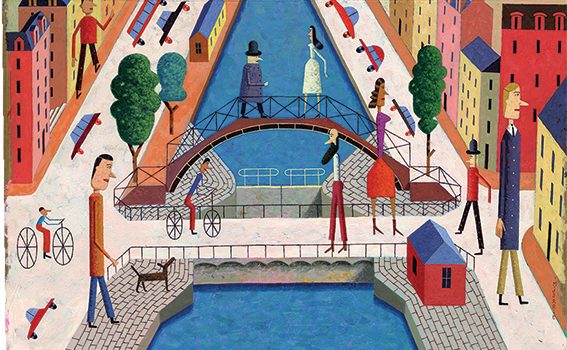The 8-Hour Choice
Have you wondered what your life would be like if you didn’t adhere to an 8-hour workday? What would a society freed from the 8-hour standard look like? Rosella examines this concept and the rise of a modern-day workforce.
Have you wondered what your life would be like if you didn’t adhere to an 8-hour workday? What would a society freed from the 8-hour standard look like?
Rosella examines this concept and the rise of a modern-day workforce.
In my days as Dame Vivienne Westwood’s legal advisor, I would sometimes find myself stopping mid-work to stare outside the window at the people walking in the streets below.

As I watched their lives unfolding uninterrupted on Milan’s pavements, the unnaturalness of my posture, of my desk’s arrangement – in fact, of my whole working schedule – would suddenly hit me like a punch in the stomach.
As I began to pigeonhole my legal career behind one desk after the other, this unease slowly but surely grew. Although I loved the work I was doing, I couldn’t help asking myself: “Why are working days Monday to Friday? Who decided we should only be allowed a two-day weekend? And why do we need to work 8 hours a day?”
The concept of the 8-hour workday has its roots in the 18th century and is closely tied to the Industrial Revolution. At the time, factory workers were clocking in between 10 and 14 hours a day – a gruelling routine that prompted Welsh social reformer Robert Owen to coin his slogan ‘Eight hours’ labour, Eight hours’ recreation, Eight hours’ rest’. Owen sparked a movement that revolutionised the structure of the working day – a movement that Henry Ford would champion many decades later.
“The concept of the 8-hour workday has its roots in the 18th century, and is closely tied to the Industrial Revolution.”
How many of us realise, as we sit at our desks from 9 to 5, that we are adhering to an arbitrary standard of productivity dating from the Industrial Revolution? When I think of this, it explains in retrospect why I had that punch-in-the-gut reaction every time I would observe life outside my office flowing in a less constricted, boxed-up way. Subconsciously, my natural state of being was being shaken awake for a few brief moments.
The 8-hour framework wholly ignores the possibility that work can be done well in far less time. This should come as no surprise given our current society, where being constantly busy has been elevated to an art form.
But if you stop and honestly reflect on those 8 hours spent behind a desk, how many of them would you say were really productive? The bottom line is that there is no fixed rule or mathematical equation that justifies 40 hours a week as being the magical number for productivity in the workplace.
I don’t deny that the 9-to-5, Monday-to-Friday working model is a blueprint that imparts society with structure and, ultimately, certainty. There is a (false) reassurance in punching in and out each day, mentally pushing the clock forward to Friday afternoon and the tantalising promise of the weekend. For many of us, this routine happens on repeat for approximately 49 weeks a year, over 40 years of our lives. The question is: when will we wake up and try a different way of working?
The rise of co-working, which has flourished everywhere from Singapore to Malta, provides one type of answer to this question. Although this mode of working still only appeals to a relatively small segment of the workforce today, this segment is expected to grow. In the US, for example, projections by software company Intuit suggest that by 2020, freelancers and independent contractors will constitute 40% of the workforce.
This growing desire for flexibility and autonomy is reshaping the global white-collar working landscape in profound ways. If co-working has changed the way we think about office spaces and cross-collaboration, why can’t we challenge the status quo when it comes to the 8-hour workday?
“This growing desire for flexibility and autonomy is reshaping the global white-collar working landscape in profound ways.”
This is a complicated question, of course, and there are no easy solutions. But what if our working schedules were aligned with our personal productivity standards – or even with our own personal values – instead of being dictated by a centuries-old norm?
For my part, I envision a conscious, global working society that equates work with living deeply. Workers would look beyond either fixed 8-hour models and beyond the sole drive to work for money, bringing their awareness of self to the professional table. Ultimately, this society might even push money out of the system entirely, and time would be measured against the currency of positive values – both personal and societal.
“I envision a conscious, global working society that equates work with living deeply.”
Is this an entirely utopic vision? Perhaps. But we owe it to ourselves to at least imagine what a society freed from the 8-hour standard would look like, and to dream of better alternatives. As for me, the once quiet unease I felt behind my corporate desk became so much louder than I ended up quitting my coveted job and flying to the other side of the planet to work in close contact with nature and children in the jungles of Bali. But that’s a story for another day.
About Rossella E. Frigerio
Formerly one of Dame Vivienne Westwood’s legal advisors and co-founder of luxury accessories brand Sofia Capri, Rossella is currently based in Malta where she is the co-hotelier of her family’s boutique hospitality concept, Locanda La Gelsomina. A strong believer in positive, genuine collaboration, she has co-founded the Malta Creative Collective and launched consultancy brand One Blue Dot, which guides emerging ventures that hold a positive and global vision.








